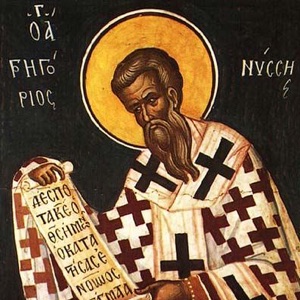
Gregory of Nyssa (circa 335 – 395) was born in modern-day Turkey. His parents were Saint Emmelia of Caesarea and Saint Basil the Elder. Gregory initially pursued a non-ecclesiastical career as a rhetorician, but was later bishop of Nyssa for many years. Gregory, his elder brother Basil of Caesarea, and their friend Gregory of Nazianzus are collectively known as the Cappadocian Fathers, who advanced the development of early Christian theology. A highly original and sophisticated thinker, Gregory was one of the first theologians to espouse that God is infinite. His work received little scholarly attention in the West until the mid-twentieth century.

Quotes by Gregory of Nyssa…
That we may merge into the deep and dazzling darkness, vanish into it, dissolve in it forever in an unbelievable bliss beyond imagination, for absolute nothingness represents absolute bliss.
To assist human beings in their search for wisdom was the purpose of the incarnation.
There are varying degrees of spiritual illumination, which accounts both for the varying outlooks to be found among mystics and for the different kinds of glimpses among aspirants. All illuminations and all glimpses free the man from his negative qualities and base nature, but in the latter case only temporarily. He is able as a result, to see into his higher nature. In the first degree, it is as if a window covered with dirt were cleaned enough to reveal a beautiful garden outside it. He is still subject to the activity of thinking, the emotion of joy, and the discrimination between X and Y.
In the next and higher degree, it is as if the window were still more cleaned so that still more beauty is revealed beyond it. Here there are no thoughts to intervene between the seer and the seen. In the third degree, it is as if the window were thoroughly cleaned. Here there is no longer even a rapturous emotion but only a balanced happiness, a steady tranquility which, being beyond the intellect, cannot properly be described by the intellect.
When someone whose mind is but partially developed sees something clothed in some semblance of beauty, he believes that this thing is beautiful in its own nature… but someone who has purified the eyes of his soul and is trained to see beautiful things makes use of the visible as a springboard to rise to the contemplation of the spiritual.
Finally the soul, which has travelled by these ways towards the things that are above and has abandoned everything that is accessible to human nature, penetrates into the sanctuary of the knowledge of God that is wrapped on all sides in darkness. There, as everything perceptible and intelligible has been left outside, there remains for the soul’s contemplation only what cannot be grasped by the intellect. It is there that God dwells according to the words of Scripture: “Moses drew near to the thick darkness.”
Know to what extent the Creator has honored you above all the rest of creation. The sky is not an image of God, nor is the moon, nor the sun, nor the beauty of the stars, nor anything of what can be seen in creation. You alone have been made the image of the Reality that transcends all understanding, the likeness of imperishable beauty, the imprint of true divinity, the recipient of beatitude, the seal of the true light.
When you turn to Him you become that which he is Himself… There is nothing so great among beings that it can be compared with your greatness. God is able to measure the whole heaven with his span. The earth and the sea are enclosed in the hollow of his hand. And although he is so great and holds all creation in the palm of his hand, you are able to hold him, he dwells in you and moves within you without constraint, for he has said, “I will live and move among them.”
Sharing in the divine fullness is such that it makes whoever achieves it ever greater, more illimitable, so as never to cease growing, because the spring of all reality flows ceaselessly. The being of anyone who shares in it is increased in grandeur by all that springs up within, so that the capacity for receiving grows along with the abundance of good gifts received.

